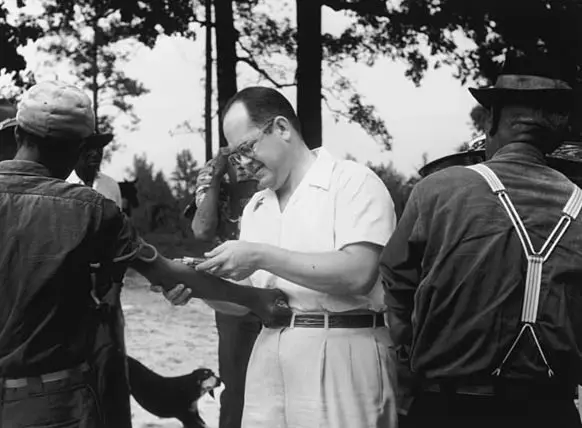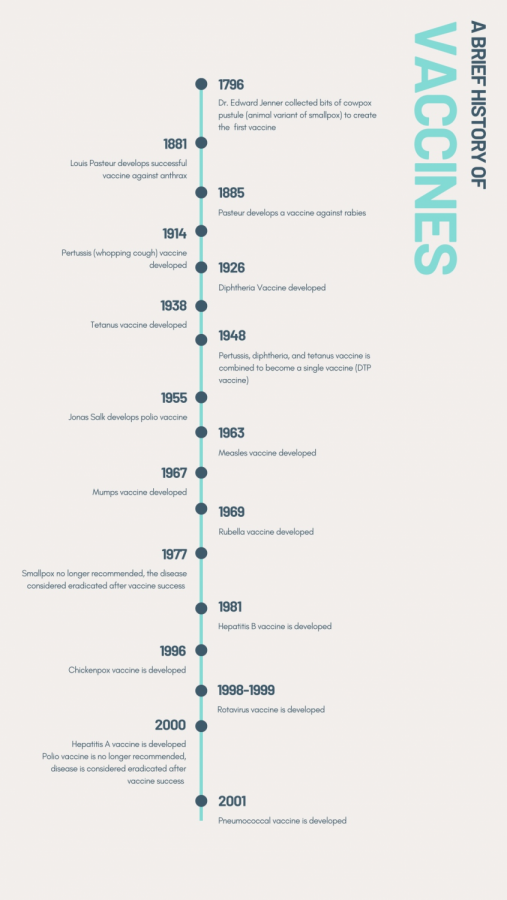OPINION: Why some African-Americans may be hesitant to receive the vaccine

Researchers injecting participants with a placebo that is meant to be a treatment for syphilis. Photo from McGill University.
October 8, 2021
COVID-19 has been a subject of debate since its tracing to identify it as a virus. As we have fought to discover a way back to normalcy, disagreements surface on the measures health professionals must take to mitigate the virus However, the 2020 pandemic is not the anomaly but rather a continuation of historical debates that surround individual liberties when it comes to vaccination.
Within a year after the COVID-19 virus came to prevalence, a vaccine was developed and released for public emergency use on December 14, 2020. Though some considered this to be victorious news, the history of vaccination among African Americans and Hispanics reveals some hesitancy in accepting the vaccine.
The first developed vaccine traces back to Dr. Edward Jennings, an English doctor who trained in London at the age of 14 years old as a surgeon. The experience he gathered training as an apprentice allowed him to carry out his 1796 experiment on eight-year-old James Phipps.
This experiment used cowpox pustules that were infected in Phipps’s arm, in order to combat smallpox. Although this discovery shaped the history of vaccine developments that followed, such as the polio vaccine, there were many ethical concerns that Dr. Jennings was criticized for following his publication of his experiment results to The Royal Society.
Many of the repulsions to the vaccine came from clergy that referred to injections in the body as “repulsive and ungodly” especially from a diseased animal. At the time, this study was justified, however in modern-day, these actions would not have been approved under the National Childhood Vaccine Injury Act (NCVIA) established by Congress in 1986.
A decade before the NCVIA was passed, another important regulation was imposed into the research world, The National Research Act passed in 1974 that followed the infamous Tuskegee study.
The Tuskegee study began in Macon County, Alabama in 1932 studying 600 African American men, 399 of the participants with syphilis and the remaining were the control group. A majority of the participants were sharecroppers who did not receive medical care prior to the experiment and therefore saw this as an opportunity to be provided with adequate care. Yet, the trial did the opposite and instead caused enormous suffering to the individuals and their families.
The study took place at a time when there was no treatment for syphilis. The purpose was to understand the full progression of the disease. Around 15 years after the study had begun, a treatment for syphilis was recommended: penicillin. With this turning point, it was a hopeful chance of recovery for the infected African American men participating in the study.
Even with available treatment, the study continued forward informing the participants that they were receiving treatment. In reality, no effective care was provided and consequences followed.
It was forty years after the trial had begun when it was finally exposed by the U.S. Public Health Service investigator Peter Buxton and an Associated Press reporter, Jean Heller, shut down the trial after it arose public outrage for the discriminatory and unethical treatment of the participants.
By the end of the study 28 patients died directly from syphilis, 100 died from complications related to syphilis, 40 of the patients’ wives were infected with syphilis and 19 children of the participants were born with congenital syphilis.
Following the exposure of this trial, President Bill Clinton issued an apology to the participants and a $10 million out-of-court settlement to the families of the participants who passed from the immoral conditions of the study.
Even so, this study is not the start of discrimination in the United States healthcare system. The issue dates back to 1619 in the British Colony of Virginia where enslaved individuals received involuntary violent medical treatment. This continuous history of discrimination in medical care among African Americans leaves some wary of the treatment they receive.
The gruesome history faced by African Americans remains unacknowledged, and in some cases this demographic group has become the highest carrier of COVID-19. Texas Lieutenant Governor Dan Patrick explains an instance of this: “Well, the biggest group in most states are African Americans who have not been vaccinated,” Gov. Dan Patrick said.
Today, African Americans and Hispanics are two times more likely to be exposed to COVID-19 and American Indians are three times more likely to be exposed, showcasing the present day challenges that these communities face.
According to a study published in the journal, American Society for Clinical Pharmacology & Therapeutics, an online survey was conducted among adults in Arkansas where they reported that Black/African American respondents were 50 percent more hesitant to the COVID-19 vaccine. Those with an income less than $25K shared that 62.50 percent had little to no fear of infection from COVID-19 but in general 55.84 percent had low trust in the vaccine’s authenticity.
Regardless of the two sides in the debate of vaccination, it is essential to acknowledge the historical faults of how healthcare systems have ignored people of color and continued to increase their vulnerability to exposure to disease.









